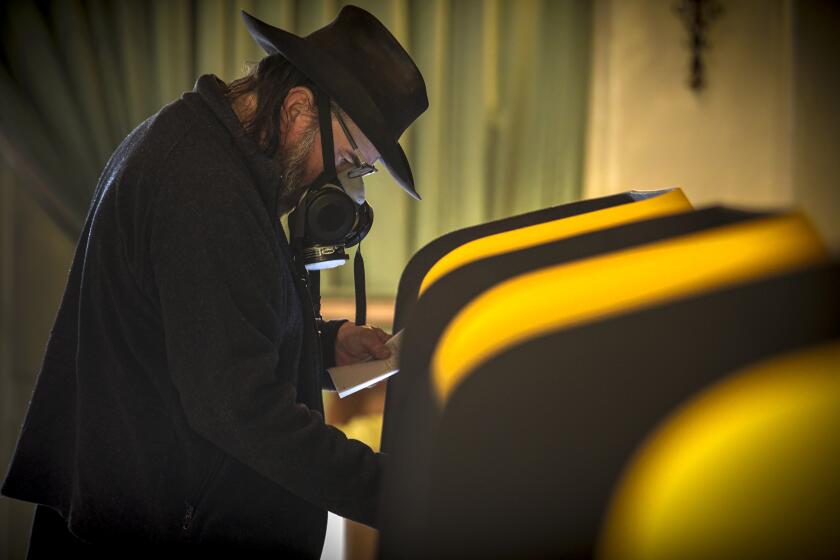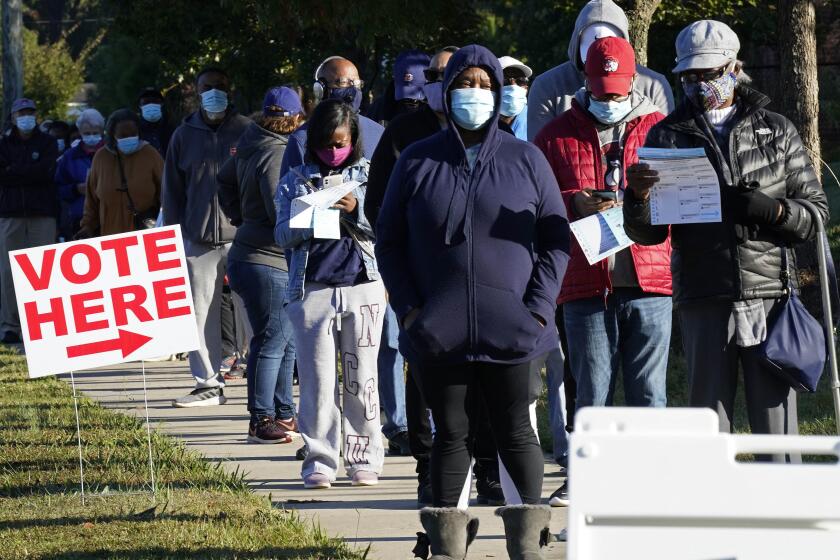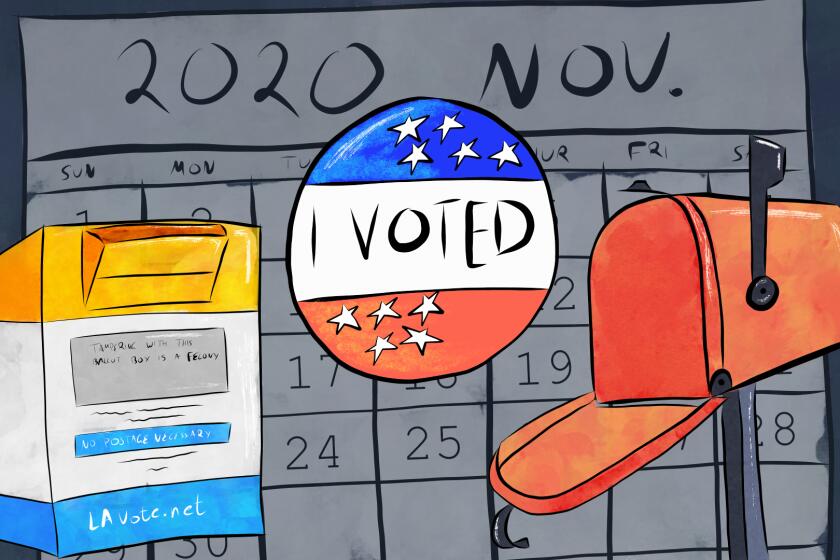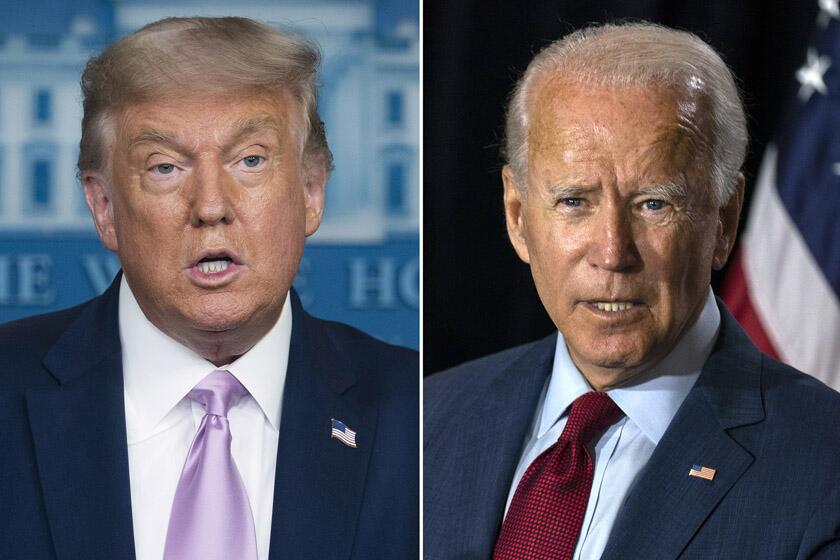Young people are driving record voting in Texas and other states
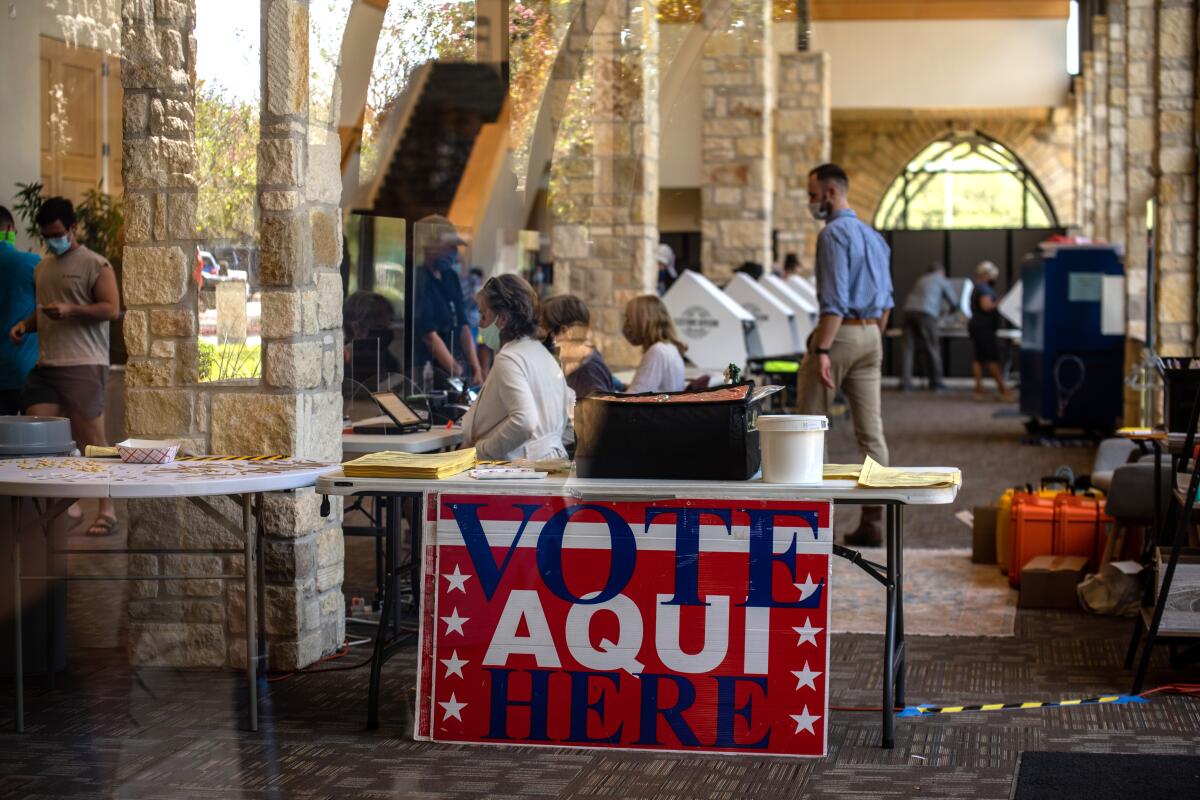
- Share via
HOUSTON — Like plenty of young people in Texas, 19-year-old Carissa Timpf felt compelled to vote, even if it wasn’t easy. She requested an absentee ballot to vote by mail. But the University of Houston sophomore never got it.
So she plans to make the four-hour drive home to Fort Worth to cast her first vote in a national election. A good friend of hers will make the opposite journey; living in Forth Worth, she’ll drive four hours to vote at her polling place in Houston.
In 2020, the hours on the road seem worth it to Timpf, emblematic of thousands of other young voters across America, who are breaking records for early voting and are poised to potentially be decisive in the presidential race and a series of close congressional contests.
“More people my age are going to vote this time around,” said Timpf, a biology major, as she walked toward the university’s student center. She declined to state her pick for president, but said she sees the urgent “Go vote!” messages all over Instagram, and concludes, “It feels very important.”
More than 6.8 million people ages 18 to 29 had voted early or by mail in the national election by midweek, a 2 ½-fold increase over their voting level at this point four years ago, according to the Democratic data firm TargetSmart. Texas has witnessed a particularly robust turnout among younger voters. As of Wednesday morning, voters under 30 had cast more than 900,000 ballots in the Lone Star State, nearly three times the number as around this time in 2016.
Younger voters helped power Texas to an unprecedented 8.2 million total votes by Wednesday, a full week before Nov. 3, the last day to cast ballots. That represents 91% of the votes cast in the state in all of 2016. Driven largely by the COVID-19 pandemic, the early vote for all Americans topped any previous election — reaching more than 75 million Wednesday, well over half the 138 million who voted in all of 2016.
Other battleground states mirrored that outsized turnout by young people, TargetSmart data showed: Young Florida voters have cast 569,000 ballots, a 42% increase over their 2016 total; some 404,000 young North Carolinians have voted, a 63% jump; and young people in Georgia have expanded their vote by 82% to more than 340,000.
Tufts University’s Center for Information & Research on Civic Learning and Engagement has found that younger voters tend to favor Democratic candidates by a 30-point margin. “That alone could make the traditionally red state of Georgia more competitive,” the center’s analysts said.
Early voting centers opened across Los Angeles County on Saturday and will remain open through election day
Texas has added about 1.9 million voters since the 2016 election. Given that the lion’s share of that growth is from younger and Latino voters, the conventional wisdom is that a majority of the new voters will lean Democratic. How Democratic is unclear.
The final magnitude of the youth vote, and its share of the electorate, remains to be seen. It’s possible that young people are voting early but will not show up in big numbers in the final week of the election — muting their impact on the race between President Trump and his Democratic challenger, former Vice President Joe Biden.
But analysts think that’s unlikely.
The early voting by young people seems to be picking up where it left off in the 2018 midterm election. Analysis of exit polls showed voters 18 to 24 years old had a higher turnout in that midterm election than in any dating back to 1974. They nearly tripled their participation compared with the 2014 midterm election.
A wave of enthusiasm has led many Democrats to mail in or cast their ballots, but experts say the race is far from over.
That fervor seems to extend into this year, a CNN poll suggests. Some 51% of registered voters 18 to 34 say they are extremely or very enthusiastic to vote in 2020. In 2016, that number was 30%.
“Young people really flexed their muscles two years ago, and once they vote they tend to vote again,” said Charlie Bonner, communications director for MOVE Texas, a nonpartisan group that seeks to get more young people to vote. “This is a massive voting bloc, and after this election we are going to have to have policy solutions that pay attention to them.”
In 32 of 40 states examined by the Tufts analysts, registration among teens and 20-somethings had increased. Georgia saw among the largest gains in youth registration, with 35% more voters under 30 registered this election cycle. Minnesota (34%) and California (26%) also saw the under-30 set expand their registration numbers substantially.
In a Gallup survey over the summer, almost 4 out of 5 young people nationally said the COVID-19 pandemic helped them realize how much political leaders’ decisions affect their lives. Many were also galvanized by the Minneapolis police killing of George Floyd in May and the racial justice reckoning that followed.
The top concern cited by the under-30 bloc was access and affordability of healthcare; the next most important topics were climate change and the environment, followed by racism.
Jan Dike is one of the young people inspired to get involved. A University of Houston sophomore, she grew up in the city’s diverse southeast side and counts immigration reform as one of the issues most important to her.
She believes Trump will only do damage in that regard and also fears his campaign against the Affordable Care Act, widely known as Obamacare, could mean that students like her would no longer be able to stay on their parents’ healthcare plans.
“The next president shapes the world we enter into as students,” Dike said.
Young Republicans say they also want to be counted this year. Ben Drewell, a freshman from Austin, said he requested an absentee ballot to vote early and chose the Libertarian Party’s presidential nominee, Jo Jorgensen. “It’s important for our voice to be heard,” the business management major said.
Votes for Democrats and third-party candidates notwithstanding, Republican presidential candidates have triumphed in Texas in 10 straight elections. Jimmy Carter was the last Democrat to win in Texas, in 1976.
Demographic trends suggest Texas will one day turn Democratic, and University of Houston junior Maya Camacho voted early to try to make that happen this year.
“I’ve seen where our country is going, and for the first time I have a say in that,” Camacho said outside the student center during an NAACP get-out-the-vote event. “I don’t want my voice to go unused.”
Camacho said she saw many people of color voting at the earliest opportunity.
“I saw all my people voting,” she said. “And I thought, ‘If we all do it together, we could turn Texas blue.’”
Rainey reported from Los Angeles and Hennessy-Fiske from Houston. Times staff writer Mark Z. Barabak contributed to this report from San Francisco.
A look at where President Trump and Joe Biden stand on key issues in the 2020 election, including healthcare, immigration, police reform and climate.
More to Read
Get the L.A. Times Politics newsletter
Deeply reported insights into legislation, politics and policy from Sacramento, Washington and beyond. In your inbox three times per week.
You may occasionally receive promotional content from the Los Angeles Times.


